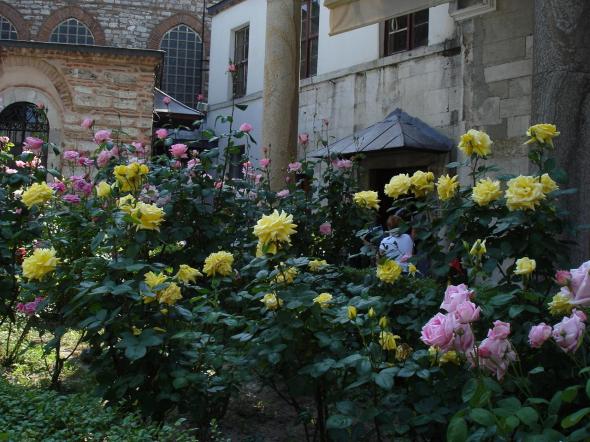Horta ~ Etruscan Goddess of Gardens
 photo Istanbul/click to enlarge
photo Istanbul/click to enlarge
Horta is the Etruscan Goddess of Gardens. One of the oldest Etruscan cities, Horta or Hortanum (now called Orte), was named for Her, and was located on the right (north) bank of the Tiber where the River Nar joined it, not far from Lake Vadimon. Horta’s name is Latin, not Etruscan, and is related to hortus, “garden”, “kitchen garden”, or “park”, and shares its roots with the Latin family name Horace or Horatio, the Etruscan form of that name being Hurtate. The Latin word has of course also given us our word “horticulture”, meaning “the cultivation of a garden”. Besides Her name and the assumptions that go with its definition, not much is known of Her–not a lot is left of Her city Horta in modern times.
According to Plutarch, a Greek author of the 1st century CE who spent some time in Rome, the temple of Horta was always kept open. He gives some cockamamie reasoning why, deriving Her name incorrectly from hortari, “to encourage” (which gives us our “exhortation”), saying that She is a Goddess who “leads man towards doing good”. It is not known where this temple was located, in Horta city or even in Rome itself. It is quite probable that he confused Horta with Hora, the consort of Quirinus; in this case the temple he refers to would most likely be located somewhere in Rome on the Quirinal Hill, and have nothing to do with the Garden-Goddess Horta.
Horti (the plural) is also the name given to a certain types of houses in Roman times, which were much like villas except that they were located closer to the city. The house and other out buildings of horti were laid out in such a way as to encourage picturesque views, and fishponds, trees, fountains and such were designed with an emphasis on beauty, the result being that the entire property was like a large garden or park. Many accounts of horti have come down from the ancients, some of which refer to parks or gardens proper, not just the estates. As the Romans loved their gardens so much it would not be surprising that they had a Goddess dedicated to them.
Horta also seems to have been confused with Nortia, the Etruscan Goddess of Fate, as well as with Hora, the deified wife of Quirinus.
She was identified with Salus, the Roman Goddess of Health, and Voltumna, a Goddess allied with Vertumnus, Roman God of change and husband to Pomona.


Leave a comment